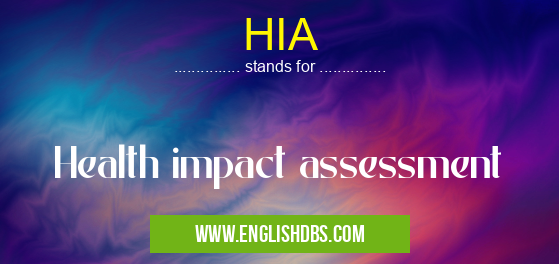What does HIA mean in REHABILITATION
HIA (Health Impact Assessment) is a comprehensive process that evaluates the potential health effects of a proposed policy, project, or program before it is implemented. It aims to identify and mitigate any negative health impacts and enhance positive ones.

HIA meaning in Rehabilitation in Medical
HIA mostly used in an acronym Rehabilitation in Category Medical that means Health impact assessment
Shorthand: HIA,
Full Form: Health impact assessment
For more information of "Health impact assessment", see the section below.
Key Features of HIA
- Proactive: Assesses health impacts before implementation, allowing for early intervention and mitigation.
- Interdisciplinary: Involves input from various experts, including public health professionals, epidemiologists, and social scientists.
- Participatory: Engages stakeholders and affected communities throughout the process to gather their perspectives and concerns.
- Evidence-based: Relies on scientific evidence and data to inform decision-making.
Steps in HIA
- Scoping: Define the scope and objectives of the HIA and identify key stakeholders.
- Baseline Assessment: Determine the current health status of the population and identify potential health risks.
- Impact Assessment: Predict and assess the potential health effects of the proposed action.
- Mitigation and Enhancement: Develop and recommend measures to mitigate negative impacts and enhance positive ones.
- Monitoring and Evaluation: Track and assess the implemented mitigation measures and the overall health impact of the action over time.
Benefits of HIA
- Improved Health Outcomes: Helps prevent adverse health effects and promotes better health.
- Informed Decision-Making: Provides evidence-based information to support decision-making and allocate resources wisely.
- Public Engagement: Facilitates public participation and empowers communities to advocate for their health needs.
- Cost-Effectiveness: By identifying and mitigating health risks early on, HIA can save future healthcare costs associated with treating preventable diseases.
Essential Questions and Answers on Health impact assessment in "MEDICAL»REHABILITATION"
What is a Health Impact Assessment (HIA)?
A Health Impact Assessment (HIA) is a process that evaluates the potential health effects of a proposed policy, plan, program, or project before it is implemented.
Why are HIAs important?
HIAs are important because they help to ensure that decisions made today do not have negative health consequences in the future. They can identify potential health risks and recommend ways to mitigate them, thereby promoting healthier communities.
When should an HIA be conducted?
An HIA should be conducted as early as possible in the planning process, ideally before a project or policy is fully developed. This allows for the greatest opportunity to identify and address potential health impacts.
Who should be involved in an HIA?
HIAs should involve a multidisciplinary team, including public health professionals, environmental health specialists, planners, decision-makers, and community members. This ensures that a wide range of perspectives and expertise is considered.
How are HIAs conducted?
HIAs typically involve a series of steps, including scoping, data collection, analysis, and reporting. The process is iterative, with stakeholder input sought throughout.
What are the benefits of conducting an HIA?
HIAs can provide numerous benefits, including:
- Identifying and mitigating potential health risks
- Promoting healthier decision-making
- Enhancing stakeholder engagement
- Improving accountability for health outcomes
- Demonstrating a commitment to community health
Final Words: HIA is an essential tool for assessing the potential health impacts of policies, projects, and programs. By identifying and mitigating risks, it helps protect public health, improve decision-making, and promote health equity. HIA is a valuable practice that contributes to creating healthier and more sustainable communities.
